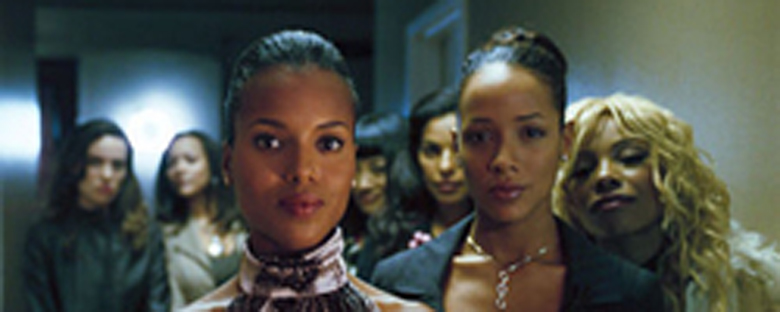Reviews
Spike Lee
USA, 2004
Credits
Review by Rachel Lears
Posted on 26 July 2004
Source Sony Pictures Classics 35mm print
Related articles
Features: The Controversy of Race in Spike Lee’s Bamboozled
Reviews: Do the Right Thing
Since last week, subways in New York City have sported posters for Spike Lee’s new film, She Hate Me, featuring the tag line “One heterosexual male. 18 lesbians. His fee… $10,000 each.” A still shows Anthony Mackie as Jack Armstrong, gazing open-mouthed at we can only guess what — all 18? A pile of bills? Or perhaps it is some evidence of the insider trading that, one learns from the trailer, gets Jack fired from his job as a bio-tech VP when he blows the whistle. This results in the cash flow problem that leads him to agree to impregnate his ex-fiancée Fatima and her new girlfriend (and, subsequently, 16 of their wealthy colleagues) for money in the first place. The film’s marketing strategy suggests that its story morphs between a gripping tale of corporate fraud and a classic male fantasy of lesbian sexuality and power.
At the première of She Hate Me, Lee’s introductory remarks added to this unmistakable double message a third: “It’s about family.” The opening credits set up a central conflict as they unfold over billowing images of US currency (including a 3-dollar bill featuring George W. Bush) — as much as the film deals with family, sexuality, and ethics, it is necessarily also about money. The intersecting force fields of these grand themes pull Jack through the interstices of a complex, at times disjointed plot to a heartwarming conclusion that affirms the triumph of familial love (noting that families come in many shapes and sizes) over capitalistic greed. Jack must confront the knowledge that money both supports families and tears them apart in multiple ways — from pharmaceutical CEO Woody Harrelson’s cynical references to the firm as a family, to his parents’ bickering over the financial and emotional burden of his father’s diabetes, to his own ambivalence about trading in paternal rights and responsibilities for a fat wad of cash.
Throughout, the film is engaging and humorous, amounting to a romantic comedy rather than the Wall Street drama cum soft porn that the trailer suggests. Cinematographer Matty Libatique delineates the multiple worlds that Jack traverses by subtly manipulating color temperatures, differentiating the cold corporation from the warmth of his parents’ Brooklyn brownstone home, and bringing the two moods into contact in Jack’s own ritzy apartment where he plies his new trade. Memories and flashbacks were shot on vintage stock, giving them a dreamy cast. Terence Blanchard’s persistent score echoes the twists and turns of the plot, at times overpowering them, but is most evocative when he reorchestrates themes from Charles Mingus’ 1963 suite The Black Saint and the Sinner Lady. Unlike some of Lee’s earlier work, notably his last film 25 th Hour, She Hate Me only sparingly employs unusual, choppy editing choices such as a repeated take of significant actions; the overall effect is entirely smooth. Like Bamboozled, which was shot on DV, Lee’s latest effort uses an unusual format for a major studio release — shot on 16mm, entirely on location, and completed in less than one month.
Some viewers may be disappointed to learn that She Hate Me displays very little girl-on-girl action. In fact, the film’s numerous sex scenes are brief, and often more silly than steamy, as the tiring protagonist gulps Viagra and Red Bull between separate encounters with a line of quirky female characters, each to varying degrees apprehensive or enthusiastic despite themselves (or partners’ objections) about the prospect of sex with a man. As in all his films, Lee confronts and plays with stereotypes in ways that challenge and at times bewilder the audience. For this one, syndicated sex columnist Tristan Taormino consulted with the cast and production team regarding lesbian identity, sexuality, and culture. Nevertheless, despite the nuanced development of a same-sex relationship in the film and the clear message supporting the right of gay couples to raise children, the lesbian characters are mostly archetypes: more than one smartly-coiffed MBA, a mousey type who reminisces about Smith College, a biker butch who calls Jack “bitch boy,” and even a Lil’ Kim-esque sexpot who attacks him while rapping.
Given these ambiguities, one wonders if the film truly offers a progressive portrayal of unorthodox families, or if the prevailing tone of humor and the charming conclusion, perhaps too tidy to believe given earlier complexities in the script, somehow undermine this possibility. Whether or not this question can be answered, it is noteworthy that a light-hearted romantic comedy raises so many thorny issues at all. While the same conflicts might have been treated in a more powerful and moving way, Spike Lee will provoke thought and discussion with this choice of heartwarming implausibility over gritty realism.
We don’t do comments anymore, but you may contact us here or find us on Twitter or Facebook.



